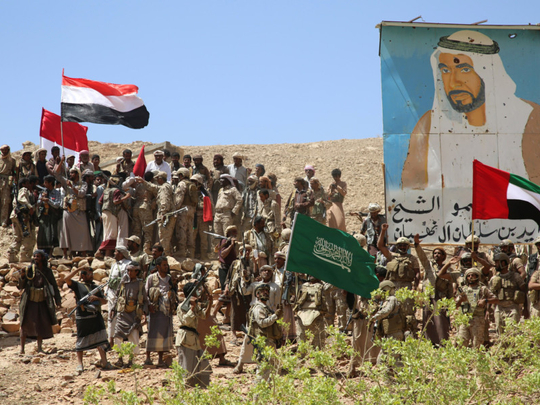
Dubai: Yemen’s Iran-backed Al Houthi militia agreed to comply with UN Resolution 2216 after realising that they are heading towards a "definite military defeat" following the recapture of Bab Al Mandab strait by forces loyal to the internationally recognised government of President Abd Rabbo Mansour Hadi, analysts said.
However, agreeing to stop fighting doesn’t mean an imminent end to the five-month-old war on Al Houthis, the analysts added.
“In my opinion, there are two main factors that have led to their [Al Houthis’] acceptance of the UN resolution: the facts on the ground and the Saudi-led coalition’s recapture of the strategic Bab Al Mandab and Ma’arib,” said Marwan Kabalan, a fellow at Doha-based Arab Center for Research and Policy Studies and a Gulf News columnist.
Yemen’s government had said that it would only sit at the negotiating table with the militia after it accepts the UN resolution.
After the Saudi-led coalition and Yemeni forces allied to Hadi recaptured the two areas, Al Houthis became “convinced that they will not win the war and that they are heading towards a military defeat that will take some time but it is surely coming,” Kabalan told Gulf News.
While Ma’arib is close to Sana’a, the Saudi-led coalition’s recapturing of Bab Al Mandab “made Al Houthis reach the conclusion that no one will come to save them and nobody will succeed in sending any kind of assistance should they continue fighting,” said Kabalan, a former dean of Faculty of International relations and Diplomacy at theUniversity of Qalamoun in Damascus.
Supply lines
“In wars, cutting supply lines and preventing the transfer of weapons is a major move [that must be undertaken] to defeat the enemy,” said Riyad Qahwaji, CEO of Dubai-based Institute for Near East and Gulf Military Analysis (INEGMA), referring to recapturing of Bab Al Mandab.
The strait could have been used to transport weapons and aid to Al Houthis from Iran, or by terrorist groups based in Africa, analysts said.
The UN announced on Wednesday evening that Al Houthi militants in Yemen had agreed to stop fighting and now a UN envoy was coming to the region to see how Yemen’s government will respond.
Egyptian military expert Jamal Mazloum believes that Al Houthis’ acceptance of the UN resolution spells the end of the war in Yemen but Qabalan disagrees.
“I believe a major phase of the war is over. Since the Yemeni situation is complicated, it could be just a truce … [But] I believe the dreams of Al Houthis and their allies from the forces of former president Ali Abdullah Saleh to regain power, to control Yemen and to get any kind of recognition, are over,” Kabalan said.












